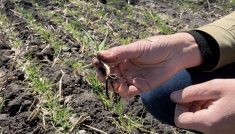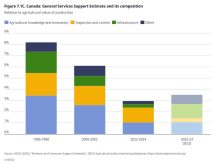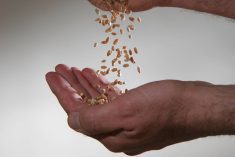“The nice thing about managing supply is it actually gives producers the tools to get it (returns) from the marketplace and we don’t keep going back to government with our hands out.”
– IAN WISHART
Canadian hog farmers should consider managing supplies, as American potato growers do, to avoid excess production and depressed prices, says Keystone Agricultural Producers’ (KAP) president Ian Wishart.
“It’s not supply management,” Wishart stressed while speaking at KAP’s General Council meeting here Oct. 15.
Read Also

Manitoba Crop Alliance’s 2026 board includes two new faces
For 2026, two new delegates join the Manitoba Crop Alliance’s board of directors, which in turn has re-upped the crop producer organization’s executive from 2025.
Supply management is a legislated system that allows farmers to use production quotas and import restrictions to match domestic production of a commodity with domestic demand, avoiding surpluses, which drive farm gate prices down and shortages that drive prices higher.
EXPORTS NEEDED
Canadian hog farmers still produce more pork than can be consumed domestically, so they must export, making supply management unattractive, Wishart said.
“We need to start working with producers in other provinces and other countries to make sure we don’t create huge surpluses that are used against us in the marketplace and drive down prices often below the cost of production,” Wishart said.
The Canadian Pork Council is interested in the idea, but the federal government isn’t, he said. If farmers want to manage supplies they’ll have to push for it.
“The nice thing about managing supply is it actually gives producers the tools to get it (returns) from the marketplace and we don’t keep going back to government with our hands out,” Wishart said.
DEFICIT GROWING
With Canada’s budget deficit and debt growing it will be more difficult than ever for farmers to get financial assistance from Ottawa, he said.
U. S. potato farmers have had some success “managing supplies,” Gary Sloik, manager of the Keystone Potato Producers Association said in an interview following the KAP meeting. In 2004 the United Potato Growers of America was formed after excess potato production in North America depressed prices. And it appears to have worked with American farmers selling their potatoes for more than the cost of production in 2005, 2006, 2007 and 2008, Sloik said.
“To be effective you probably need 75 to 80 per cent of the people inside so everybody follows the rules,” he said. “If you get a higher percentage outside it’s tough to initiate flow controls.”
The United Potato Growers of America is essentially a cooperative, Sloik said. A big part of its job is tracking production and demand. It found when 200 million hundredweight of potatoes hit the U. S. table market in a week, prices tumbled. The market can take about 1.8 million hundredweight a week.
“Beyond that it just crashes the market because people don’t eat more just because it’s a little bit cheaper,” Sloik said. “And the cheapness doesn’t even get to the stores because the wholesaler will sell them off and the retailer maintains his price.”
OVERSUPPLIES
According to Joe Guenther of the University of Idaho a one per cent surplus in potatoes causes prices to fall seven per cent, Sloik said.
“And that’s what we’re trying to avoid, overproduction,” Sloik said. “It’s a waste of resources. It’s costly to the producer to grow extra acres.”
It also hurts processors who don’t have plants where the surplus and low prices are, he said.
Sloik said despite its success the United Potato Farmers of America is facing trouble because a large number of Idaho farmers have pulled out. Idaho produces more spuds than all of Canada.
Another weakness is the U. S. manages acres, not production.
“We don’t sell acres, we sell hundredweight (of potatoes) so as the yields go up on those acres you’ve still got some overproduction,” he said.
In 2005 U. S. farmers cut the number of potato acres 10 per cent, but potato production only fell five or six per cent.
GATHERING INFORMATION
The United Potato Growers of Canada was formed in 2006. It doesn’t have the same legislated powers as its American counterpart, Sloik said. The Canadian organization focuses on gathering production and marketing data on behalf of Canada’s potato boards and associations.
Amendments being planned for the Competition Act could make what the United Potato Farmers of Canada does illegal. Although its focus is data, it also discusses prices, which could be seen as an attempt to fix prices. Since marketing boards are allowed to discuss pricing, some Canadian potato growers are wondering if they should go for a marketing board, Sloik said.
“We know that marketing boards are frowned on,” he said. “If we don’t have quotas that may give us the status that we need to be able to collect data and keep people informed and even collect a checkoff fee so you can run this system and keep the information going.”
There are some similarities between hog and potato production, especially farmers’ reliance on a local processor, Sloik said. Hog producers might influence prices by managing supply, he added, but it will take co-operation on both sides of the border.
“It’s one market – a North American market,” he said. “If we can look at it that way there is so much to be gained and I think people will take a serious look at it.” [email protected]

















